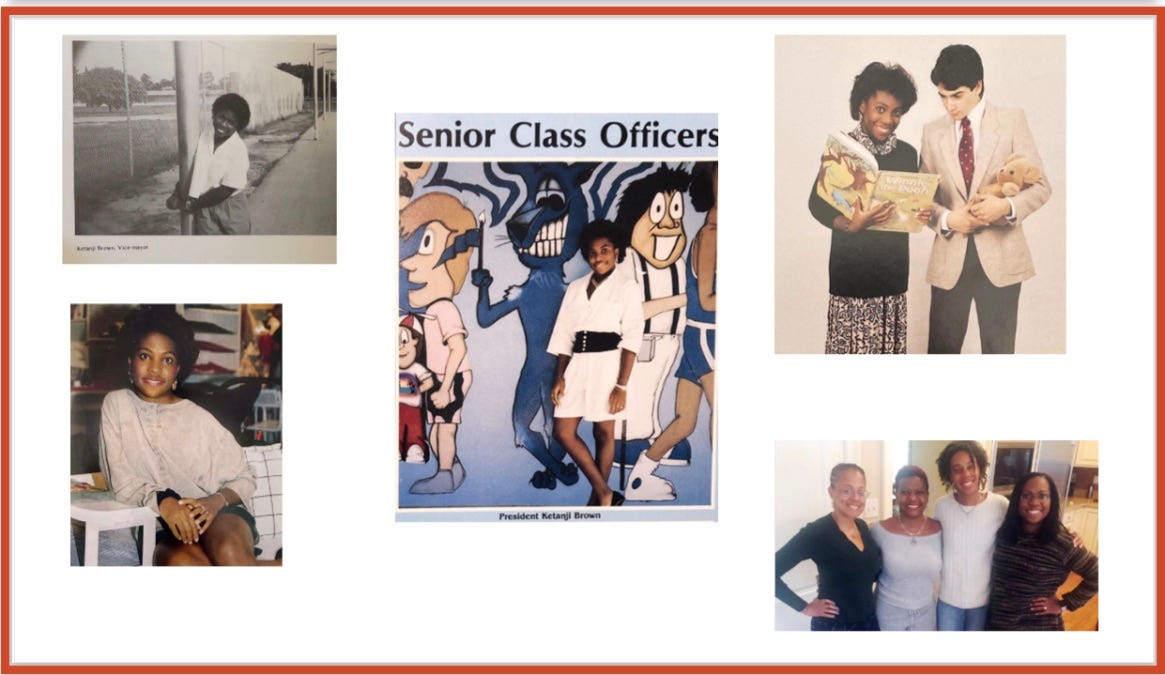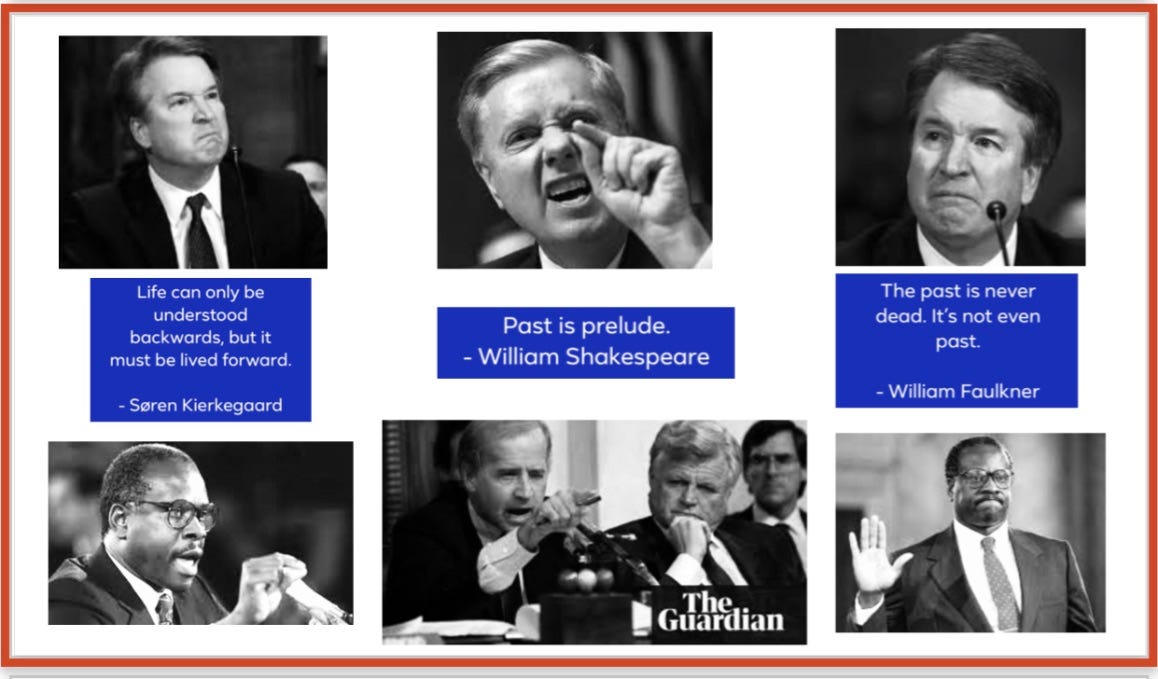Our American Love-Hate Affair with Aggression (Part I: Friday, 4.1.22)
Historic Justice, Grace Notes... and Specters in the Room
🐇🐇 Weekend newShrink greetings, and lucky-rabbit wishes for the new month ahead!

For several reasons this has turned out to be a two-part edition, first a closeup then a big-picture view in Part II across the broader news-scape depicted visually above.
From extensive news coverage this Part I zooms in to profile Judge Ketanji Brown Jackson (top left), whose confirmation hearings as nominee for the U.S. Supreme Court are currently under way in the Senate. The quantity, variety and political noise-volume of material on the nomination are high. So I’ll point here to a variety of images, stories, angles and links of possible interest while keeping my own comments within newShrink’s focus on the psychological dimensions.
Email readers: In your Friday inbox you’ll be seeing both Part I and Part II, each titled for planned Friday and Sunday website postings — a bit of reading-time flexibility in case things like basketball and extended-family stuff figure a lot in your weekend ahead, like mine.
On Process and Theme
In a whirlwind news-week like this one, there has been both intense closeup scrutiny of one story and news figure and also a big-picture range of other stories with some compelling connections across multiple arenas and contexts. On this continuing question of how best to bring the newShrink’s-eye psychological and soul view to bear, a couple of images and terms, and an overarching theme, have surfaced.
🌀First (and to my mind’s ear a bit oddly) is bridge notes — a play on the recorded observations and ideas psychologists and therapists do from one week or session to the next with each patient or client. With newShrink the term suggests not only thinking and speaking across time from one week to the next, but also across a range of intersecting issues and concerns that may range from race, gender and power and political dynamics to vastly different groups… and finding or forming a bridge on which meaningful discussion is even possible.
🌀Second, as illustrated especially vividly with this week’s zooming in/zooming out from the Ketanji Jackson story, the process is rather kaleidoscopic. A bit like using the old-fashioned instrument, with one turn of the lens there’s a closeup pattern of the glass pieces into one colored pattern… and the next twist presents a seemingly widened view farther back, different colored glass patterns. Yet still there are patterns, like snowflakes. (Or what Jung called mandalas, powerful symbols of wholeness — subject perhaps for another day!)
🌀And third, a distinct pattern appearing this week with both the Jackson hearing closeup and the broader stories, is this title theme of the relationship we Americans seem to have with one of our universal human instinctual drives: aggression. More specifically, just how ambivalence — or more than ambivalence, a combination of love-hate and utter denial — we have about this core element of our humanness. As with all instincts it sometimes actually serves our survival as individual and species. Along with sexuality, hunger, thirst, pleasure, aggression is right up there on the short list of our most powerful unconscious (soul/psychological) drivers.
🌀Other themes to read and listen for from depth psychology and neuroscience include blind spots and shadow; effects and physiological markers of emotional arousal and reactivity on cognitive performance, judgment and impulsivity; and indicators (vs lack) of psychological and moral maturity and individuation throughout the adult life span.
Note: For Substack technical reasons only some of today’s news articles and sources are linked as underlined in the text. Click here to access today’s Library of all links, sources and references. The usual navigating details for accessing all links and references on the newShrink website are at the bottom of this post after closing comments.
🔵
Finishing the final week of Women’s History Month this profile spotlights both the nominee and the Senate hearings currently under way, Judge Ketanji Brown Jackson for the U.S Supreme Court seat being vacated by Justice Stephen Breyer. As The Washington Post’s succinct visual chart below summarizes, Jackson brings a deep and wide set of credentials equal to or far beyond those of current or predecessor justices. She’s been endorsed by such national groups as the Fraternal Order of Police. Her impeccable record as far back as junior high school covers academics, debate and leadership offices, strong family, character, religious faith, and a solid history of court decisions examined and deemed fair and even-handed by at least two ideologically neutral reviews. Here we look at this process of historic justice, the many elements of grace in every sense of the word… and some of the specters in the room, the ghosts of hearings past.
Historic Justice
Jackson Vows to Be Independent on Supreme Court if Confirmed (The New York Times)
Jackson pledges to decide cases ‘without fear or favor' (Associated Press in The Charlotte Observer)
Opinions | Ketanji Brown Jackson shows why she was nominated (The Washington Post’s Jennifer Rubin, historically a pre-Trump conservative voice)
Takeaways from Day 3 of Ketanji Brown Jackson’s confirmation hearings (PBS)
Supreme Court nominee Jackson faces more questions on sentencing, precedent (From The Washington Post, some good coverage with fact-checking analysis in real time)
🌀 A note and observation here on something I’m observing with Jackson: how the word integrity refers both to truthfulness and wholeness… which in turn speaks to psychological and moral maturity.
🌀From a psychological standpoint what I’m looking for is the clear sense, by middle adulthood, of whether the person — and certainly for someone being elevated to the highest levels of service and leadership — demonstrates that there is a through-line, a connection with a continuing, strengthening (“individuating”) thread to what Jung terms the capital-S or Soul Self.
🌀There are no abrupt gaps, shifts of affect or overreactive defensiveness.
🌀Rather than bombast or grandiose “perfection” there’s an ease with humility, the sense that inevitable shortcomings or errors are owned and addressed.
🌀 These indicators are not about political party or ideology, and are in stark contrast to two of the current sitting justices on the Court as well as to many elected officials of both parties.
Grace Notes…
Who’s who in the Jackson family (CNN.com)
Meet Jackson’s spouse Patrick Johnson (From Town & Country Magazine)Jackson’s
Jackson is related by marriage to former House Speaker and Candidate for Vice President Paul Ryan, pictured above. (Jackson’s husband Patrick is the twin brother of Ryan’s brother-in-law William Jackson, whose wife Dana is the sister of Ryan’s wife Janna.)
Ketanji Brown Jackson was a hall of famer even in my high school (From CNN)
🌀I’ll say more about the 2018 nomination hearings of Justice Brett Kavanaugh below, but here the many stories and images from Jackson’s school career from 8th grade through Harvard — and particularly high school years’ and yearbook — are in stark contrast to those served up by now-Justice Kavanaugh.
How a High School Debate Team Shaped Ketanji Brown Jackson (NYT)
The Supreme Court nominee honed her oratory on Miami Palmetto’s powerhouse debate team. She was not the only alum who went on to an impressive career.
With Jackson the capacity for finding middle ground, history goes back to school days (The Washington Post)
At Harvard, a Confederate Flag Spurred Ketanji Brown Jackson to Act (NYT)
🔵
Moving now to those echoes of past and shadow elements — which, by the way, Senator Lindsey Graham himself reopened aloud at this hearing as part of a twisted mock-angry diatribe spoken to Jackson but directed at his Democratic colleagues for the benefit of his base. (With Graham it’s easy to track when the histrionics are contrived; he sweats, turns red, spits and cries when genuinely panicked — as with Kavanaugh.) These photos are in black and white as a visual reminder to keep them in visible but background perspective. And yes, the term specter used here for past ghosts is a play on the vocal and visible roles the late Senator Arlen Specter played in the notorious 1991 Senate nomination hearing of Justice Clarence Thomas.
Specters in the Room…
Republicans just can't seem to find a good way to attack the Supreme Court nominee. (Again, WAPO’s Jennifer Rubin)
Judging a Judge on Race and Crime, G.O.P. Plays to Base and Fringe (The New York Times)
🌀Even without Graham’s opening salvos the developing news about Clarence Thomas and his far-right activist wife Ginni outside the hearing room heightened interest. But at each of their respective nomination hearings and since, I have intensely and closely studied and followed Clarence Thomas and Brett Kavanaugh.
🌀During the Thomas hearing — then a corporate communicator, no longer a newspaper journalist and not yet a psychologist — I covered miles out walking every day with the hearing via NPR on my Walkman and giant earmuff-style headset. Also caught some of the Anita Hill testimony on TV.
🌀Two of many riveting things about that case have forever haunted, and probably influenced both my study and practice in psychology and lasting, intense focus on news and public figures. First is an irrefutable fact that was readily verifiable at the time, which I happen to know personally: Clarence Thomas lied under oath, specifically in his statement to discredit one of the two additional (like Thomas and Hill, also Black) former employees claiming experiences similar to Anita Hill’s. Thomas said the employee was seeking revenge because he had fired her for making derogatory comments about LGBTQ people. Not only did he not fire her, but he provided a glowing recommendation of her to her next employer, a newspaper. (Based on this statement — and Thomas’ enraged rant accusing the Biden-led male committee of “a high-tech lynching” — the committee didn’t call the two corroborating witnesses brought by the FBI investigation to Washington to testify.)
🌀Second, along with Hill’s obviously reluctant and credible testimony — with two additional Black corroborators who were never called — was the contrast between the multiple allegations of furtive shadow-sexual acting-out toward Black women and Thomas’ marriage to this highly visible, even then far-right extremist white wife. Even before long years of psychological study and training, this rang every alarm bell, that something is powerfully split-off from the rest of the whole person here. And when that’s the case, it’s kept unconscious so is out of control… and it runs things. Never mind just recusal on January 6 cases because of his wife’s involvement. It’s a giant rip in psychological integrity. Even thinking of this guy’s ruling on cases involving sexuality, race, women… etc. etc. gives me the shivers.
🌀I have similar intensity, which also comes down to one or two factual elements, around the Kavanaugh case decades later. The Christine Blasey-Ford testimony that brought such explosive culmination of his nomination and appointment happened to fall on my birthday in 2018. Having been following the hearings with the newShrink lens under development, I basically spent that entire birthday there!
🌀Again my take on it all comes down to three factors, all psychological — two of them clinical. One was the utter lack of basic psychological knowledge, definitions, clinical indicators etc. — on the part of participating Senators of both parties as well as a disturbing range of seasoned, otherwise informed journalists. Regarding Blasey-Ford this showed up in ignorance, the incapacity even to inquire intelligently, about PTSD and adolescent sexual development.
🌀Worse, regarding Kavanaugh — and with huge impact on the hearings’ outcomes — was the same ignorance about alcohol abuse, symptoms, effects on behavior, memory, judgment etc. Specifically, the term blackout drinking was repeatedly and misleadingly misused both by Kavanaugh and everyone in the room on both sides (including Senators with direct experience and knowledge about alcohol abuse) — plus every journalist writing or reporting on it repeatedly. Blackout drinking does NOT mean “passed-out.” It means “so drunk one does not and cannot later recall what did or didn’t happen while drinking.” (It’s actually a warning indicator of increased tolerance that points to more advanced alcohol abuse disorder than passing out.)
🌀 Why is this important? Kavanaugh’s own repeated testimony about how much he just liked beer, and his written accounts in calendars, yearbooks, notes with friends, of just how much beer and how little he recalled the next day about it, are the pivotal facts at issue here. This is the material he presented to defend himself against accusation of aggression/sexual assault!
🌀Kavanaugh’s screaming, sobbing, utterly out-of-control rants over being questioned weren’t righteous anger but visible expressions of raw terror — not because he did, or didn’t, assault Blasey-Ford. But because he has, and can have, no idea whether he did or not. There is no way he (or anyone) could, when drinking at what are the memory blackout levels he himself described, in his own written notes for the time and printed his yearbook, no less.
🌀Had this been an allegation of a long-ago hit-and-run accident that harmed someone during massive amounts of underage drinking, rather than a politically and emotionally charged sexual #metoo era one, it’s hard to imagine anyone of either party buying the argument that “I was a kid, boys will be boys, and I was so drunk I have no idea whether I hit them or not.” Just a big, careless “oops, never mind.”
🌀These are clinical psychological takes on public displays in the Kavanaugh case. But the more important one to me is on the depth psychological level of adult individuation, maturity and moral development. The alarm bell is Kavanaugh’s entire inability and unwillingness, even or especially as a well-established professional, husband, father in his 40’s, to own and take responsibility or acknowledge consequences of his well-documented, at best utterly careless, drunken excesses and behavior that results when the usual filters on instinctual aggression (as well as hormone-driven teen sexuality. (And, where the usual filters of appropriate adult supervision in this affluent community of prep school teens is a question that continues to be mystifying.)
🌀To me it doesn’t even rise to the level of judicial temperament. Although I disagree with a lot of Kavanaugh’s writings and rulings — particularly those where he switched positions dramatically and consistently with where he was working or aspiring to be next — I have also found him smart with an inquisitive intellect I like. Regardless of ideology a mature person saying, “Oh my, I am so ashamed, I was young and careless and so drunk I have no idea whether I did or didn’t do something hurtful… and I am so sorry” is worthy of respect. Psychologically and morally, this guy is in some ways still 15 years old. And when cases touching on those parts of him come up, its the 15-year-old issuing the rules for all of us.
🌀That is all of my rant on these specters. Whew!
At this week’s Jackson hearing that base- and fringe-performance intensified. Here are a few comedic takes with
… some not-so-pure silliness
Jackson had to keep her cool. These Black women could relate. (The Washington Post)
Many Black women interpreted Jackson’s reactions as a prime example of how they try to maintain composure in the face of workplace hostility.
Review of Supreme Court nominee Ketanji Brown Jackson's opinions shows outcomes cut both ways (USA Today)
Retired federal judges defend Ketanji Brown Jackson’s sentencing record on child porn cases as 'entirely consistent' (CNN)
Booker to Ketanji Brown Jackson: 'You are my harbinger of hope'
Video from Rachel Maddow (MSNBC)
Cory Booker to Katanji: “Nobody is going to steal my joy… you have earned this.” (From NPR)
The following headline almost foreshadows the breaking news this week intensifying around Ginni Thomas and ethical implications for her husband on the Court. In vivid contrast was Jackson’s immediate — and completely voluntary — recusal pledge. (The Supreme Court has no conflict of interest recusal requirements as lower courts do.)
Supreme Court nominee Jackson says she would recuse herself from Harvard affirmative action case (The Washington Post)
With the Jackson nomination heading toward the full Senate this week, or soon, I’ll wind up this Women’s History Month with a thankful grace-under-fire nod to her and to others, like Madeleine Albright, Hillary Clinton, Anita Hill, who have withstood such hours of hot-seat questioning, often of an absurd if not outrageous nature, content and tone, in those hearing rooms where somehow all of the emotionally aroused, hysterical, sobbing, screaming, tearful rants seem to come from men.
🌀
Today’s closing image honors April Fool’s Day of this ‘22 year of the Fool. Here the Fool is both numbers 0 and 22, beginning and end, in Tarot. (This is in the greater fool and closing comments of the New Year’s Postcards 1.1.22 newShrink. For more recent reader-subscribers those good-luck double rabbits at the first of a new month are in there, too.)
Again I’ll leave you with those new-year’s wishes, for a heightened sensitivity to the promises of life… a perpetual inner soundtrack of musical morning Joy… and. in the infinite depth-psychology wisdom of the late Coach Yogi Berra:
When you come to a fork in the road, take it!
And, that is all I have in Part I. Talk to you soon!
🦋💙 tish
•🌀🔵🔷🦋💙
… it is important that awake people be awake,
or a breaking line may discourage them back to sleep;
the signals we give — yes or no, or maybe —
should be clear: the darkness arous is deep.
— William Stafford, “A Ritual to Read to Each Other”
🔵
Navigating tips for linking all newShrink content:
• You can click directly to links from phrases that are underlined in the text.
• Click here to access today’s Library of all links, sources and references.
• As there are new developments and updates referencing issues and stories we have looked at in previous newShrink editions, or if you miss an email edition, you can access everything that’s ever been posted by clicking the newShrink website here or the couch logo at the top of this email.
• Or directly from a browser go to newshrink.substack.com. From the home page you can find all posts in Archives and About.









